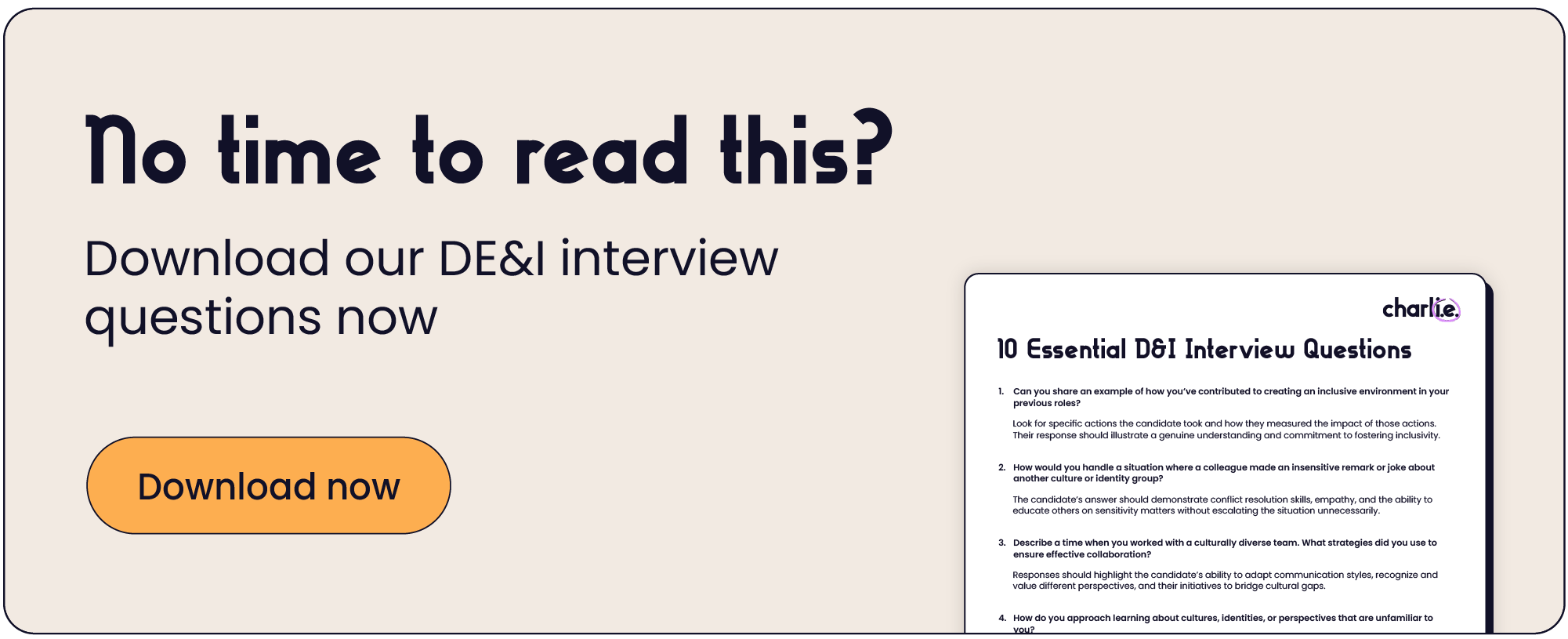10 diversity and inclusion interview questions to create an equal workplace

Having a diverse workplace has tangible benefits for your business.
There are negative repercussions to not including diversity and inclusion in your hiring process. If your workplace comes under fire for being toxic or having a lack of inclusion, it can damage your brand reputation in ways that are hard to undo. Taking steps to be more diverse and inclusive makes your brand seem more human because it reflects a broader range of the human experience.
I'm quite passionate about diversity and inclusion and I believe it doesn't create a better workplace, but a better, kinder world. In this post I'll offer some guidance on how to make your interview process more inclusive and give you a list of diversity and inclusion interview questions.
Legal framework and compliance considerations
The Equality Act of 2010 ensures fair employment practices, promoting unbiased interviewing and hiring processes without discrimination based on protected characteristics. It's not just a legal duty; it's an opportunity to strengthen your team with inclusive practices.
This law exists for good reason. The employment rate for ethnic minorities is only 62.8% in the United Kingdom, and only 1 in 6 hold top management positions.
When crafting interview questions, focus on the candidate's professional qualifications and aspirations, avoiding personal inquiries that could lead to discrimination.
Want to make an interview checklist? Check out our own.
For instance, it's acceptable to ask about a candidate's ability to handle job-related challenges but inappropriate to inquire about future family plans, which may be seen as discriminatory, especially towards women. Instead, discuss career goals, skills, and how they can contribute to the team.
Maintaining a focus on these principles not only aligns with the Equality Act 2010 but also sets a solid foundation for cultivating a diverse and dynamic workplace environment.
Why DE&I is important
DE&I interview questions should extract a candidate's stance on, and experience with, fostering an inclusive workplace environment.
Your questions should probe the underlying ethical and professional fabric that shapes their career ideals. They should evaluate not just what candidates have accomplished, but how they've done it — especially when it comes to interacting with a diverse array of co-workers.
Crafting these questions, however, is a sensitive process. It requires a blend of empathetic understanding, an acute awareness of unconscious bias, and a pursuit of inclusivity.
How to come up with diversity focused interview questions
To craft effective DE&I interview questions that truly assess a candidate's ability to contribute to a culture of inclusion and equality, consider the following best practices:
- Open-Ended Questions: These allow candidates to share their thoughts, experiences, and contributions in their own words, offering deeper insights into their understanding and commitment to DE&I. An example of such a question is, "Can you describe a time when you advocated for diversity and inclusion in the workplace? What was the situation, and what actions did you take?"
- Scenario-Based Questions: Present candidates with hypothetical workplace scenarios that involve diversity and inclusion challenges. These questions evaluate a candidate's problem-solving skills and their ability to apply DE&I principles in real-world situations. For instance, "Imagine you're leading a team where two members have a misunderstanding due to cultural differences. How would you address this situation to ensure inclusivity and respect within the team?"
By using open-ended and scenario-based questions, you can uncover valuable insights into how a candidate thinks, acts, and contributes to DE&I initiatives, ensuring that your hiring process remains aligned with your organisation's values and commitment to equality.
What to look for in candidate responses
It's not just what candidates say, but how they say it, that reveals their D&I credentials. Look for:
- a genuine, lived commitment to inclusivity that permeates not just their professional lives, but also their personal ethos
- awareness of their own biases and how they've worked to overcome them
- specific examples of what the candidate has done to address DE&I issues, like holding training sessions, advocating for inclusive policies, and mentoring coworkers from historically marginalised groups.
Considerations for DE&I interview questions
Compliance with the Equality Act 2010 does not mean a bland or irrelevant set of queries. It is possible to craft dynamic and engaging questions within the law. The Act is a framework within which the interview process must operate, but it does afford creativity and insight in gauging D&I competencies.
Here’s what you should think about doing on a regular basis for your business:
- Setting regular DE&I training sessions for your hiring team.
- Consulting with experts in DE&I can significantly enhance the quality of your interview questions.
- Documenting your interview processes, including the questions asked and the rationale behind them.
10 Essential D&I Interview Questions + Free template
- Can you share an example of how you've contributed to creating an inclusive environment in your previous roles?
Look for specific actions the candidate took and how they measured the impact of those actions. Their response should illustrate a genuine understanding and commitment to fostering inclusivity.
- How would you handle a situation where a colleague made an insensitive remark or joke about another culture or identity group?
The candidate’s answer should demonstrate conflict resolution skills, empathy, and the ability to educate others on sensitivity matters without escalating the situation unnecessarily.
- Describe a time when you worked with a culturally diverse team. What strategies did you use to ensure effective collaboration?
Responses should highlight the candidate's ability to adapt communication styles, recognize and value different perspectives, and their initiatives to bridge cultural gaps.
- How do you approach learning about cultures, identities, or perspectives that are unfamiliar to you?
Look for a proactive and open-minded approach. It’s important that the candidate views diversity as a strength and is committed to continuous learning about others.
- In your opinion, what is the most challenging aspect of working in a diverse environment, and how do you manage it?
This question tests the candidate’s honesty and self-awareness. Their response should reflect an understanding of potential challenges and constructive strategies to overcome them.
- Can you give an example of how you have accommodated or would accommodate a colleague with a disability?
The answer should reflect a thoughtful consideration for accessibility, an understanding of inclusivity beyond cultural and racial diversity, and a readiness to advocate for supportive adjustments.
- Why do you think diversity and inclusion are important in the workplace?
The candidate should articulate a clear understanding of the value of diversity and inclusion, going beyond generic responses to highlight personal beliefs and experiences that shape their views.
- Have you ever initiated or participated in a program or initiative focused on DE&I? What was your role, and what was the outcome?
This question seeks to identify candidates with proactive engagement in DE&I efforts. Responses should detail their involvement, the goals of the initiative, and tangible results.
- How do you handle receiving feedback from colleagues of diverse backgrounds or identities different from your own?
Expect answers that show respect, openness to learn from the feedback, and the ability to incorporate it positively into their work and behaviors.
- What steps would you take to ensure you are approachable and supportive to colleagues of all backgrounds and identities?
The best answers will include specific strategies for building trust, such as being a good listener, being open about their own learning process regarding DE&I, and showing genuine interest in their colleagues' perspectives and experiences.
Be an agent of change when it comes to DE&I
Every interview, every hiring decision, every job description, and every policy refinement is an opportunity to enhance inclusivity and diversity. Whether you're an HR professional crafting a new set of interview questions or a small business owner seeking to foster an inclusive ethos, the decisions you make today ripple into a future of equitable opportunities and vibrant workplaces.
To help you hire people according to DE&I principles, it can also be useful to have an applicant tracking system that is aligned with these values – our Charlie Recruit tool will give you everything you need to put together a fair hiring process:
- Blind hiring: our tool anonymises CVs and hides information such as gender and age during the screen process to make sure decisions are made on skills and competencies only
- Weighted scorecards: assess each candidate according to their skills sets by using scorecards, ensuring you don't make decisions based on a gut-feeling but on concrete and fair data




